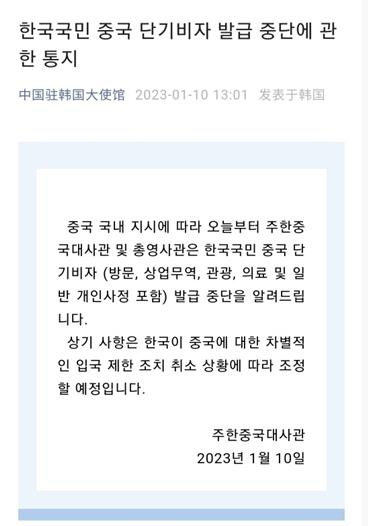China suspends issuing short-term visas for Koreans
By Park Jun-heePublished : Jan. 10, 2023 - 15:24

China said Tuesday that it would stop issuing short-term visas for Koreans, including those traveling to the country for business purposes and tourism, in retaliation against the Korean government’s tightened COVID-19 restrictions against passengers from the neighboring country.
The Chinese Embassy in Seoul said it was suspending the issuance of short-term visas to China for Korean nationals starting Tuesday under instruction from Beijing, via its official WeChat account. The embassy added that the rules would be adjusted depending on South Korea’s plans to cancel its "discriminatory entry restrictions."
The Chinese government has warned that it would take "equal and corresponding measures" against those countries that have toughened quarantine mandates for China arrivals.
The United States, Japan and Italy are among the countries that have toughened their travel restrictions from China. Korea is the first country that China has stopped issuing visas to after making such warnings.
The embassy reiterated its position regarding the issue to The Korea Herald, saying that the visa suspension would be lifted “only when the South Korean government plans to ease restrictions against arrivals from China.” It declined to comment further.
Local media outlets reported that the M visa, issued to travelers entering China for commercial purposes and trade activities, and the S2 visa, given to those who have foreign family members residing in China or for private purposes, have been suspended.
Long-term visas like the China work visa or the Z visa, the X1 international student visa, and the Q1 visa for Chinese descendants or foreign spouses of Chinese nationals, are reportedly not subject to the move.
Soon after the announcement, Korea's Foreign Ministry said that it had been communicating with Beijing over the measure through a bilateral diplomatic channel. While vowing to work closely with Beijing, the Foreign Ministry's spokesperson defended Seoul's quarantine mandate for travelers from China that it said has been implemented based on "scientific and objective" evidence.
Another Foreign Ministry official, however, expressed regret over Beijing's retaliatory move, saying the ministry had already delivered Seoul's position on the matter and said it would try to "closely communicate" with China.
The decision comes after the South Korean government announced it would toughen quarantine measures for all arrivals from China and restrict short-term visas for Chinese nationals until the end of this month, as the neighboring country saw a surge in virus cases after pivoting away from its draconian “zero-COVID” policy last month.
Under the COVID-19 protocols, all travelers flying from China must either present a negative PCR test result conducted two days before departure or a rapid test result a day before boarding.
Those arriving from China on short-term stays of fewer than 90 days are required to get tested immediately upon arrival and be accommodated at the airport until their test results are known. Long-term travelers must be tested at a public health center within a day of entry and quarantine at their residence until their test results confirm they are negative.
Travelers from Hong Kong and Macao are also required to submit negative pre-entry virus tests over the possibility that passengers from China might travel through those two autonomous regions to avoid the rules.
Also, flights to Korea from China, Hong Kong and Macao are only permitted to land at Incheon Airport.
The rules are set to be in place until Feb. 28 and could be extended depending on the outbreak situation.
The measure has been carried out according to the principle of reciprocity, an official at the Chinese Embassy in Seoul was quoted as saying by Yonhap News Agency.
The announcement came a day after a phone call between South Korean Foreign Minister Park Jin and Chinese Foreign Minister Qin Gang to discuss concerns over Seoul's quarantine mandate.









![[Kim Seong-kon] Democracy and the future of South Korea](http://res.heraldm.com/phpwas/restmb_idxmake.php?idx=644&simg=/content/image/2024/04/16/20240416050802_0.jpg&u=)








![[KH Explains] Hyundai's full hybrid edge to pay off amid slow transition to pure EVs](http://res.heraldm.com/phpwas/restmb_idxmake.php?idx=652&simg=/content/image/2024/04/18/20240418050645_0.jpg&u=20240418181020)

![[Today’s K-pop] Zico drops snippet of collaboration with Jennie](http://res.heraldm.com/phpwas/restmb_idxmake.php?idx=642&simg=/content/image/2024/04/18/20240418050702_0.jpg&u=)